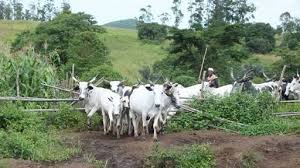Agriculture
Focusing on Agribusiness
- By solomon2day
- On 12/09/2022
- Comments (0)
- In Solomon's Column
Inspiring strides from viable societies have proved that agriculture has the potential to solve several internal challenges, including food shortages, prohibitive prices of foodstuffs, unemployment and the heavy dependence on the monthly federal allocation, among others.
Unfortunately, the agriculture sector in several states has been unable to provide jobs for the majority of the unemployed, particularly the youth, even as kidnapping for ritual and ransom purposes are now the preferred choices.
In addition, the worrisome state of government-owned farm settlements has made the cultivation, processing,packaging and storage of varieties of crops impossible.
Sadly, the lack of capacity, policy bias, underinvestment and misinvestment have all along been impediments to the development of agribusiness in affected states.
In addition, the government at all levels have failed to create a conducive environment to attract investors into the sector, even though a number of them still insist that their major focus is agribusiness, but this is not in tune with happenings in so many states.
Note- It is a source of serious concern that those who have aspirations for political offices are only dissipating energy to actualize their self-centeredness, while human lives are sacrificed daily under the guise of violent crimes. This is the height of inhumanity and insensitivity.
Namibians spend more on Food as Cost of Living Rises
- By solomon2day
- On 29/07/2021
- Comments (0)
- In News
 Namibians now spend more on food and non-alcoholic beverages as the cost of living rises unabated.
Namibians now spend more on food and non-alcoholic beverages as the cost of living rises unabated.
This is contained in a report by the Namibia Statistics Agency.
The report also stated that in comparison to a year ago, as of June 2021, 32% of the price increases consumers experienced are on food and non-alcoholic beverage items.
Food accounts for approximately 14,8% of consumer expenditure monthly.
However, this varies from one income group to another, with some people spending more than that on food.
The report noted that for June 2021, the annual inflation rate increased by 4,1% compared to 2,1% recorded in June 2020.
''Last month's inflation rate was the highest over the past 12 months. Year-to-date, prices of goods and services have been increasing at the rate of 3,4% on average.
On a monthly basis, the inflation rate increased by 0,5% compared to 0,3% recorded a month earlier.
The inflation rate for the food sub-category increased by 7,7% during June 2021 compared to an increase of 4,9% during the same period last year. This is way higher than the rate at which other goods' prices are increasing in the country.
Meat is the most expensive food item in Namibia, as according to NSA, “meat was 16% more expensive than a year ago, which registered 8%”. Chicken recorded the highest increase in this category at 25,2%, followed by offal at 18,2%.
On non-meat food items, rice recorded the highest inflation, as it was 18% more expensive than June last year, followed by bread at 10,5%. Prices for vegetables, including potatoes and other tubers, increased by 6,8% in June 2021 compared to 11,7% recorded in June 2020.
The slowdown was caused mainly by the drop in the prices of carrots (-21,9%), onions (-20,8%), and green pepper (-12,2%), as local production came to the rescue. Eggs recorded an upward price change of 7,2% followed by fresh milk, long-life milk at 5,6%, and cream at 3,6%,'' the report concluded.
Targets and Action Plans for food Security
- By solomon2day
- On 20/08/2020
- Comments (0)
- In Solomon's Column
Successive administrations in Nigeria, the present inclusive, believe that the country has great potentials in agriculture, but the slow pace of agricultural growth, the inability to generate adequate employment in the sector, in addition to the insignificant socio-economic growth, the high poverty level and the feverish state of democracy have all contributed to the worrisome state of governance today.
The obvious food insecurity confronting a large chunk of the population living below the poverty line and the embarrassing absence of participatory democracy among others are militating factors to the ever elusive agricultural growth as promised by the federal and State Governments.
With majority of the poorest of the poor residing in the rural areas, the over 21 years of democracy has confirmed that it would be nearly impossible, perhaps, to pin point the specific dividends of democracy, when a majority of the population are unemployed and live below the poverty line, when inadequate availability of agro-industrial raw materials impede industrial growth and when agriculture cannot, for obvious reasons, perform its known functions in the economic development process.
Agriculture, without doubt, has great potentials for achieving a broad-based economy, but its performance remains unimpressive.
If government at all levels have sincere plans to alleviate the present sufferings of the people, then the revival of the Strategic Grains Reserve and reintroduction of Guaranteed Minimum Price System is crucial.
Sadly, the mindset of the youth and their aspirations have defied all known logic, as same are suggestive of fetish and diabolic initiatives for wealth creation. These initiatives would never promote agricultural development.
Finally, Nigerians find it extremely difficult to identify specific targets and action plans set by the Federal and State Governments for accomplishment, this is just as farmers across the country are full of lamentations over the poor state of affairs i the troubled sector.
The Hopes in Agriculture for a Better Economy
- By solomon2day
- On 09/12/2019
- Comments (0)
- In Solomon's Column
Agriculture has the potentials of been a major revenue earner in Nigeria, if only farmers had not been neglected for several years and deprived of needed incentives.
Indeed, farmers in rural areas have never been encouraged to remain within their localities to propel increased farm production, while production at the local government level has made the availability of schools,Primary health Care Delivery, functional electricity and potable water a mirage.
The caretaker committees at the grassroots have only succeeded in impoverishing the rural populace.
At present, agricultural equipment and machinery are sourced from advanced countries, this alone, is an impediment to self sufficiency in food production.
Indeed, sub-standard farm equipment and machinery to a large extent affected output in most farms in the country, just as access to finance is a major challenge for farmers. Bank interest rates are not friendly, if at all the banks are ready to give out loans to farmers. Although the Federal Government assures that it would fully support the agricultural sector, inadequate funding of the sector, closely trailed by diversion of funds meant for agricultural production is still common place.
The erratic power supply, prohibitive cost of petroleum products and the activities of insurgents, bandits and kidnappers have all contributed to make the agricultural sector less attractive.
Truly, government monopoly in critical sectors is an advantage, but bad management as a result of corruption is the idiscussion on every motuh in the land.
At Nigeria’s level of development government ought to invest alongside private individuals. But waiting for the agricultural sector to blaze the trail, is a sign of lack of vision. It is only when the country has reached full employment level, that government can think of divesting.
Has Nigeria reached the level of full employment ? This might not be so, as the National Bureua of Statistics is very reluctant to make public the rate of unemployment in the country, even though the answer could be seen on the faces of millions of jobless Nigerians.
Without doubt, the agricultural sector can provide millions of jobs, once the leadership appreciates what is required to transform the economy.
But good management revolving round a porous judicial system and law enforcement agencies are never the panacea for sustainable development and growth.












